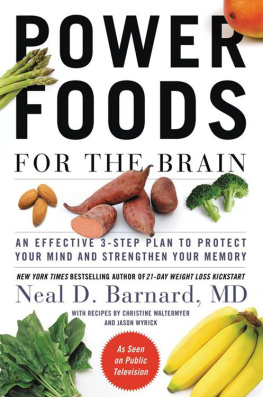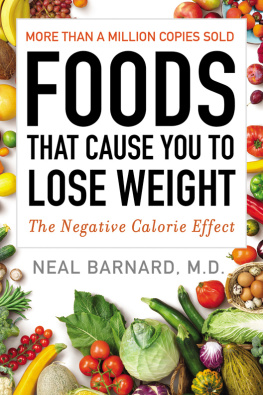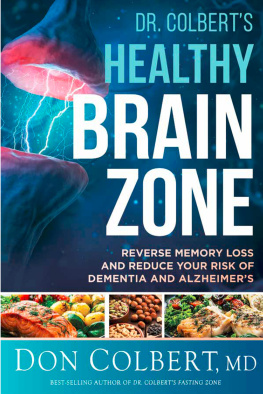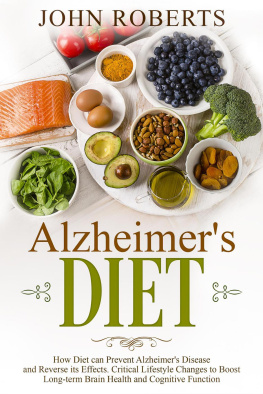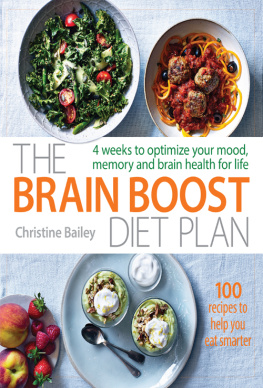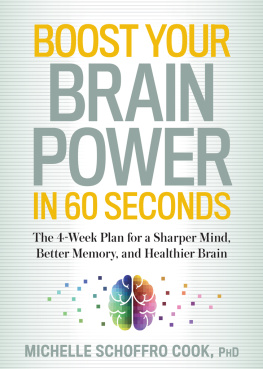
In accordance with the U.S. Copyright Act of 1976, the scanning, uploading, and electronic sharing of any part of this book without the permission of the publisher constitute unlawful piracy and theft of the authors intellectual property. If you would like to use material from the book (other than for review purposes), prior written permission must be obtained by contacting the publisher at permissions@hbgusa.com. Thank you for your support of the authors rights.
To Drs. David and Alexandra Jenkins,
who are lighting the way for others to follow.
I hope this book provides you with new insights into important health issues and gives you tools to tackle them. Before we begin, let me mention two important points:
See your health-care provider. Memory problems are serious business. It is important to have an appropriate evaluation and care. I would also encourage you to speak with your provider before making any diet change. This is not because changing your diet is necessarily dangerous. Quite the opposite. Adjusting the menu is a good idea. But people who are taking medicationsfor diabetes or high blood pressure, for examplevery often need to adjust their medications when they improve their diets. Sometimes they are able to discontinue their drugs altogether. Do not do this on your own. Work with your health-care provider to reduce or discontinue medicines if and when the time is right.
Also, talk with your doctor before you jump into a new exercise routine. If you have been sedentary, have any serious health problems, have a great deal of weight to lose, or are over forty, have your provider check whether you are ready for exercise, and how rapidly to begin.
. In particular, be sure to take a daily multiple vitamin or other reliable source of vitamin B12, such as fortified cereals or fortified soy milk. Vitamin B12 is essential for healthy nerves and healthy blood.
I owe an enormous debt of gratitude to many people who helped bring this project to fruition. First, thanks to our research team and colleagues who, over the years, have shaped fundamental concepts of health and nutrition: Mark Sklar, MD; Andrew Nicholson, MD; Gabrielle Turner-McGrievy, PhD; Joshua Cohen, MD; Kavita Rajasekhar, MD; Ulka Agarwal, MD; Suruchi Mishra, PhD; Paul Poppen, PhD; Susan Levin, MS, RD; Joseph Gonzales, RD; Jia Xu, PhD; Heather Katcher, PhD; Lisa Gloede, RD; Ernest Noble, MD; Jill Eckart, CHHC; and Amber Green, RD.
Thanks also to the many investigators at other research centers whose work has brought to light the power of foods to affect health in general and the brain in particular. I am particularly grateful to Martha Clare Morris, ScD, of Rush University Medical Center, whose painstaking work has opened up new possibilities for protecting the brain. David J. A. Jenkins, MD, PhD, of the University of Toronto, continues to lead groundbreaking nutrition research with direct benefits for countless people.
Christine Waltermyer and Jason Wyrick used their considerable culinary skills to turn the scientific concepts in this book into wonderful recipes.
John McDougall, MD, and Mary McDougall have been constant inspirations and fountains of information, and answered many questions along the way.
Special thanks to the physicians, scientists, and others who critically reviewed the manuscript: Lawrence A. Hansen, MD; Erika D. Driver-Dunckley, MD; Travis Dunckley, PhD; Leonid Shkolnik, MD; Clifford Schostal, MD; Nikhil Kulkarni, MD; Hope Ferdowsian, MD; Caroline Trapp, MSN, APRN, BC-ADM, CDE; Edie Broida, MS; Brenda Davis, RD; Doug Hall; Lynn Maurer; Shaina Chimes; and Jillian Gibson.
Thank you to Ellsworth Wareham, MD, and Duane Graveline, MD, for allowing me to share their experiences and profit from their wisdom. Thank you to Cael Croft for his excellent illustrations and to Chris Evans, PhD, of the University of Glamorgan, Wales, for helping me color the manuscript with historical facts.
Huge thanks to my editor, Diana Baroni, and my literary agent, Debra Goldstein, for their enthusiastic support and expertise in transforming concepts and ideas into a tangible tool that can be put to work for better health.
And finally, thank you to everyone at the Physicians Committee for Responsible Medicine for your boundless innovation and energy in spreading the word about good health.
They were not very tidy and not very clean. They smoked as they played and they ate and talked and pretended to hit each other. They turned their backs on the audience and shouted at them and laughed at private jokes.
T hat was how Brian Epstein described the Beatles when he first saw them at a Liverpool club in 1961. In leather jackets and jeans, this ragtag foursome did not attract the interest of a single record company in Britain, or anyone else outside a short radius.
Yes, they were scruffy. But they had energy and magnetism, and plenty of drive and ambition. They couldnt read music, but they had an irresistible sound. Although Epstein had never managed a band before, he took them under his wing, determined to help them succeed. He dragged them to a London tailor and plunked down 40. Out with the leather jackets and jeans and in with proper suits. And no more greaser haircuts; it was time for a new hairstyle. No eating, smoking, or swearing onstage, and please learn to bow to the audience at the end of a set. He scheduled performances, arranged publicity, and made sure everyone got paid.
Within nine months, the Beatles had their first hit on the British pop charts, and within two years, they had conquered the world.
The reason I am telling you this is because inside your brain you have unruly needs, wants, drives, and ambitions, too. Your early Beatles reside deep in the center of your brain, in your hypothalamus. This nut-size organ is the locus of hunger, thirst, sex, and anger. And if there is one thing it needs, it is a manager.
By the time you were born, your hypothalamus was already signaling its demands. But all you could do about it was to wail and thrash your arms and legs.
Your Brian Epstein is in the outer layers of your brain, in your cerebral cortex. It takes your ragtag, scruffy self and all its wants, drives, and ambitions, and gets things organized. It helps the desperate hypothalamus to wait patiently when food is on the way. It solves your problems and guides you to get what you want more effectively than by simply stamping your feet. As the years go by, your manager matures, developing ever more sophisticated ways of getting what you need and like.
By August 27, 1967, eighteen Beatles songs had topped the charts, and they were at the peak of their popularity. But that was the day that everything changed. Brian Epstein was found dead in his apartment. He was just thirty-two. And for the Beatles, it was the beginning of the end. The group began to sputter. They had arguments, with no arbiter. Disagreements became chronic and bitter. Rudderless, they lost their musical cohesiveness, drifted apart, and eventually the most successful musical group of all time collapsed, each member going his own way.
Inside your brain, your own fateful August 27 is looming large. Just when your knowledge and experience are at their maximum and your family life and perhaps your financial security are finally established, thats exactly the moment that you are at risk of losing your manager. If that happens, you will find that you cant remember things or will have trouble reasoning things out. Sometimes things go downhill to the point where you are no longer able to control your disorganized, unruly, unmanaged inner self. The day the manager in your brain becomes nonfunctional is the day that life as you have known it comes to an end.
Next page
